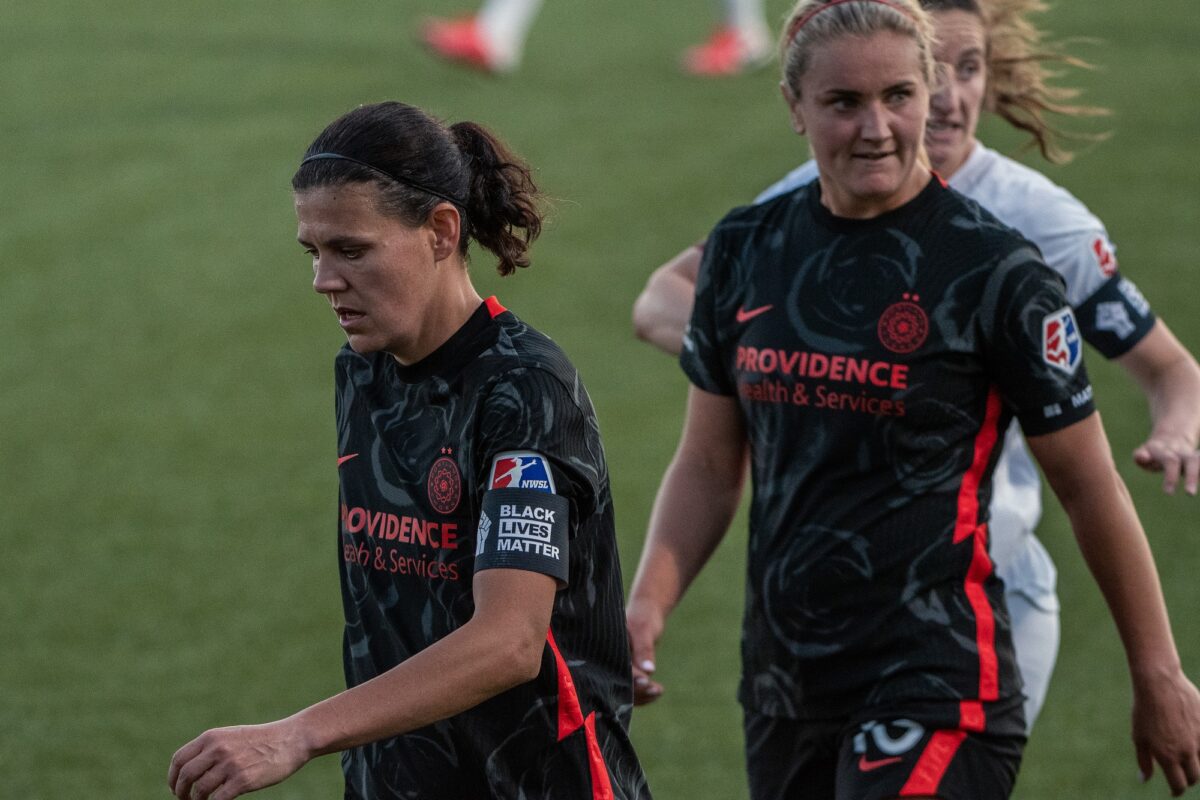To view this content, you must be a member of the Rose City Review Patreon
Already a qualifying Patreon member? Refresh to access this content.
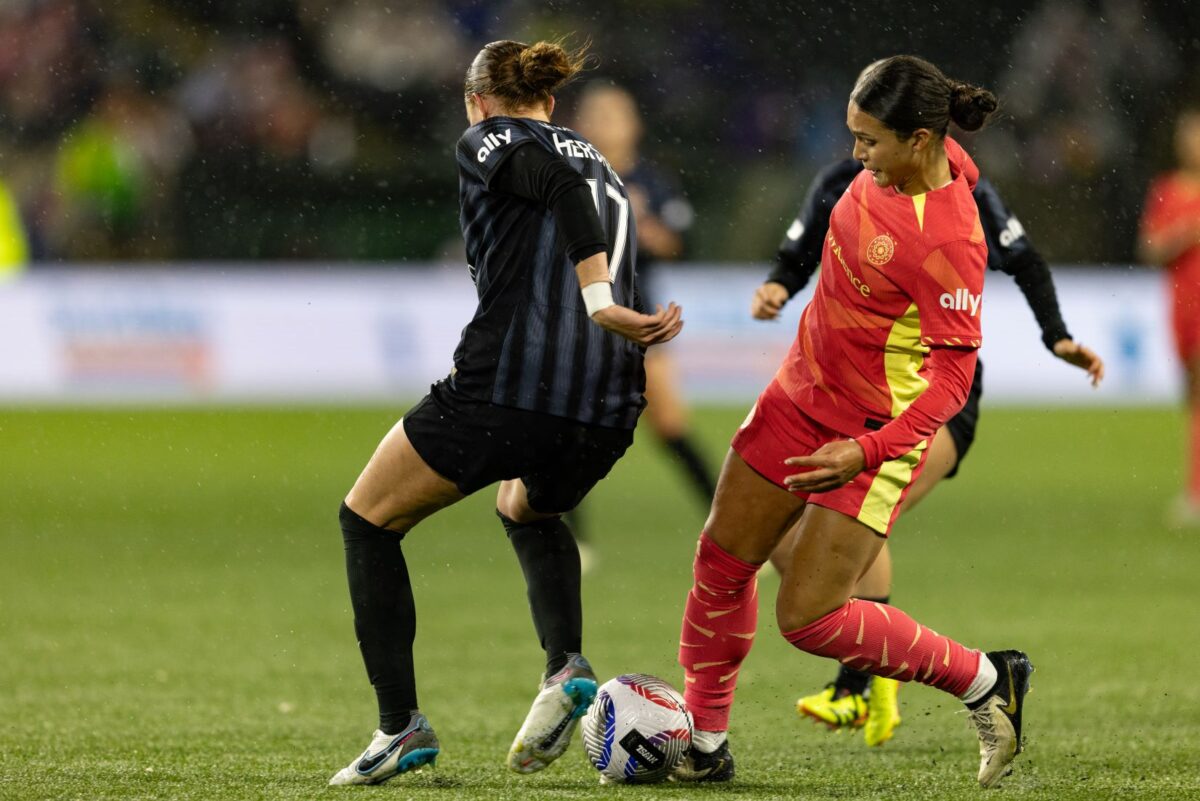
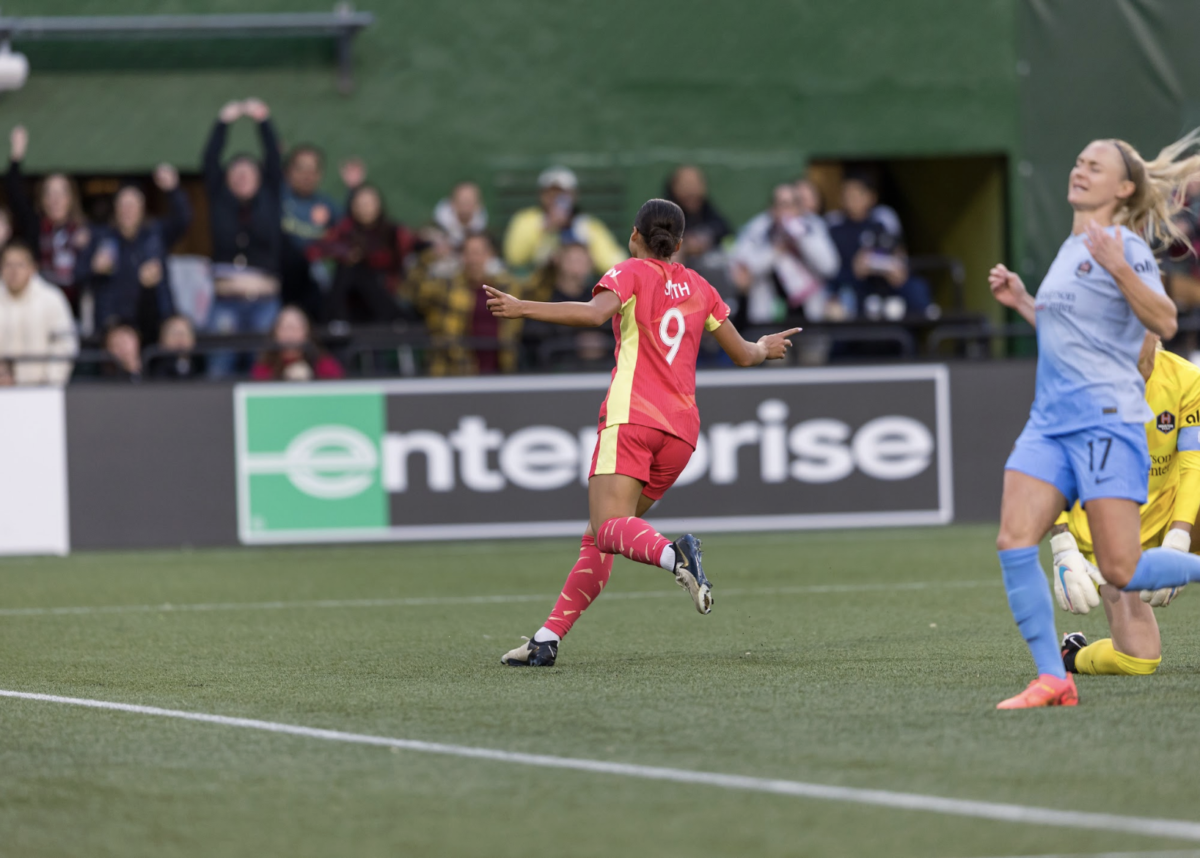
The Portland Thorns’ new Ken-look-alike interim head coach Rob Gale has an undefeated record in the NWSL as Portland (finally) picks up their first home and road wins of the 2024 season. It’s been a slow and bumpy start to the season, and while it’s too early to make any calls on how competent Gale is as a coach, there is officially enough data to try and determine what type of team the Thorns are going to be under his interim tenure.
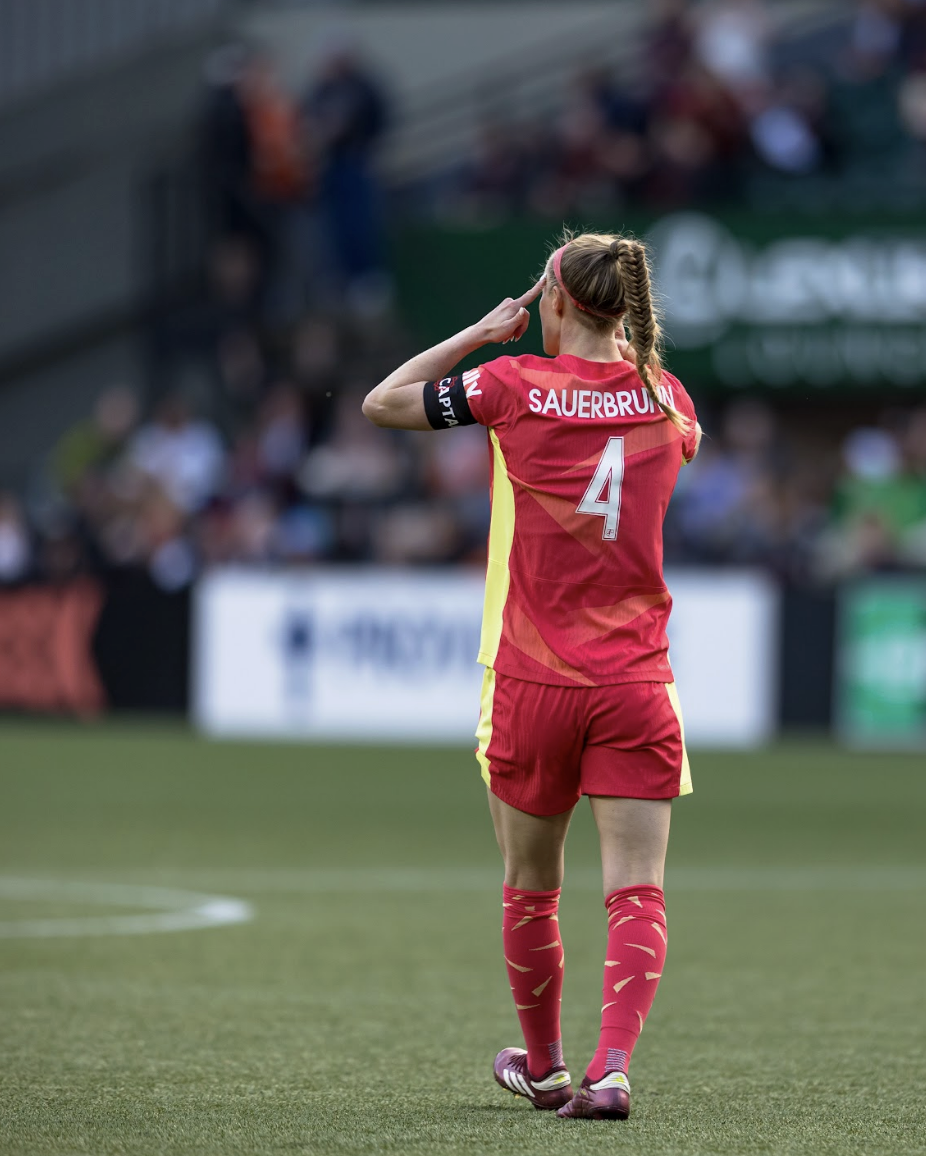
The Thorns conceded within the first 10 minutes of three of their four first games of the season. Luckily—or more likely, intentionally—Portland has flipped the script and were able to score first in the sixth and 10th minute of their last two matches. Postgame against Houston, Sophia Smith credited the fiery start to a change in the team’s warmup, something that ensures the team gets a taste of competition and “that fire in our blood flowing before we step on the field and the kickoff happens.” The new pregame ritual includes competitive games like rondos.
“To win is the expectation,” Smith said. “This is the Thorns that we know.”
Olivia Moultrie said these wins have felt like “the start of a new season for the Thorns,” as they set a new standard for performances going forward.

Gale has not made many changes to the starting XI that the Thorns began the season with, but the two he did make made all the difference. Firstly, Hina Sugita has played 90 minutes in both games, compared to being a second-half sub under former head coach Mike Norris. Hina a versatile player that needs to be on the pitch and can slot in pretty much anywhere in the front six. She played as a box-to-box midfielder in both games, connecting 88% of her passes in those 180 minutes and earning one assist. Gale’s choice to exchange Hina for Moultrie in the starting XI balances out Portland’s midfield; as in the first few games of the year, we saw Moultrie and Jesse Fleming occupying many of the same spots, leaving empty gaps in the midfield for the opposition to play through.
After the Houston game, Gale said the midfield “smothered Houston” due to their pressing, and he was right.
Hina, Sam Coffey, and Fleming started against Chicago as well and worked very well together, combining for nearly 86% passing accuracy going forward. It seems as though the Thorns have found their ideal midfield trio going forward.
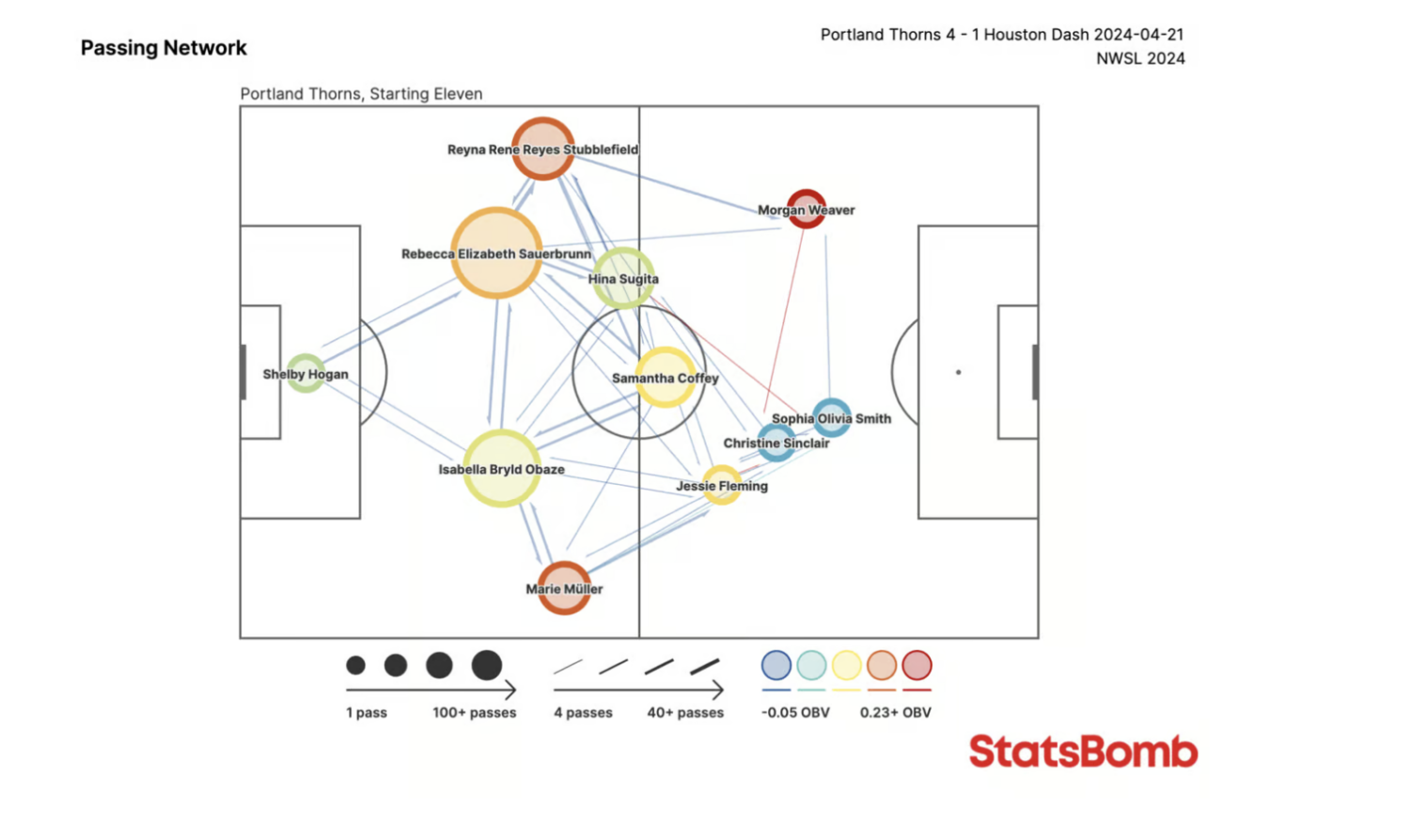
The passing map from the Houston game makes it clear that the Thorns have well-executed passing triangles, which result in quick give-and-goes up the side of the pitch. The front three look a little wonky because Christine Sinclair and Smith frequently switch between center and wide forward, but the triangles are still there.
The Thorns are finally looking like the well-oiled machine that they have been in years past. I would also like to give a special shoutout to Isabella Obaze, who has looked remarkably strong and seasoned beyond her years in recent games, growing tremendously since that first showing in Kansas City.
Gale starting Sinclair up front was a very curious (and unpopular) choice, but it allows Janine Beckie to come off the bench against tired legs, which is where she shines. After an ACL injury and a poor 2022 season, Beckie is still trying to find her footing on an attacking-heavy Thorns roster, especially with Payton Linnehan impressing in her early minutes. Sinclair, interchanging with Smith up top, has really surprised me. In the last two games she has one goal and one assist, showing that she can still be productive. I liked the Thorns using her to set a tempo and mindset early, and I think her presence up top helps ground the team as they work through their early-game jitters. Even if Sinclair’s speed and touch isn’t what it used to be, her mind is definitely still there.
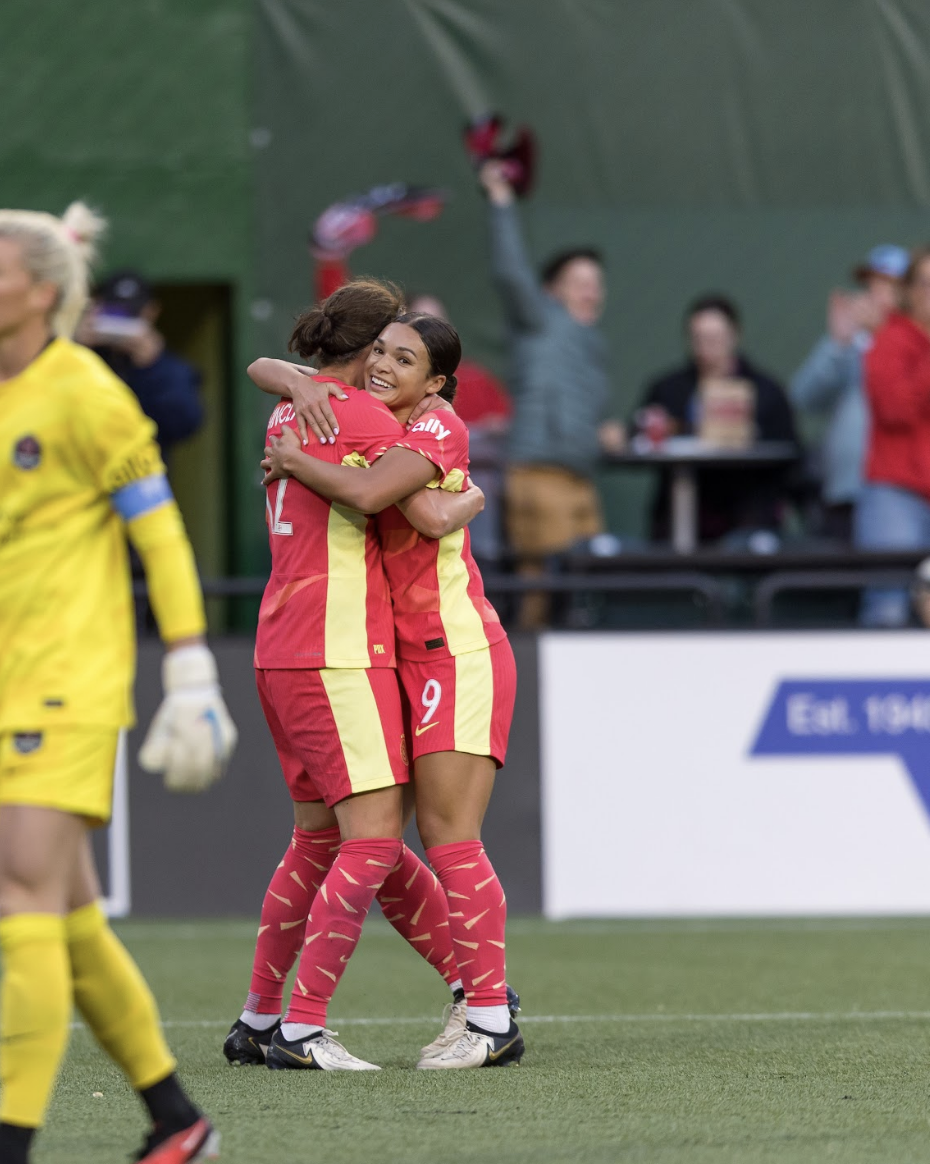
Shelby Hogan posted her first clean sheet of the season on Saturday, making three saves against Chicago. While her decision-making on the line was sharper than in previous games, Hogan’s distribution and ability to build out of the back still remained a major issue for the Thorns, as she gave the ball away in compromising positions numerous times and was bailed out by the woodwork. Prior to the game against Houston, the Thorns signed Mexican international Emily Alvarado from the Dash to provide competition for Hogan for the starting role. It was a move that makes sense at first, but upon closer investigation, leaves a little to be desired. I have been an advocate that, with Bella Bixby out on maternity leave, Portland needs an experienced keeper available for training and games. The Thorns started the season with three keepers who had played in two NWSL regular season games between them, the most inexperienced goalkeeper union in the league.
Here is where the confusion lies: Alvarado also has zero NWSL regular season minutes, having served as Jane Campbell’s backup since Houston acquired her from Stade de Reims in early 2023. While she does have 39 starts in the D1 Arkema, she conceded 66 goals in those games. With the Thorns still working on building chemistry across their back line, bringing in another inexperienced keeper doesn’t make much sense. At this point, why not give Lauren Kozal a try in her second year with the team? Or even Kat Asman, who the Thorns drafted 39th overall and who has been with the team since the beginning of preseason. With a three-game week, I assume that we will see Alvarado in goal against Bay FC on Wednesday, and I am curious to see if her distribution and ability to organize the backline is any stronger than Hogan’s currently is.
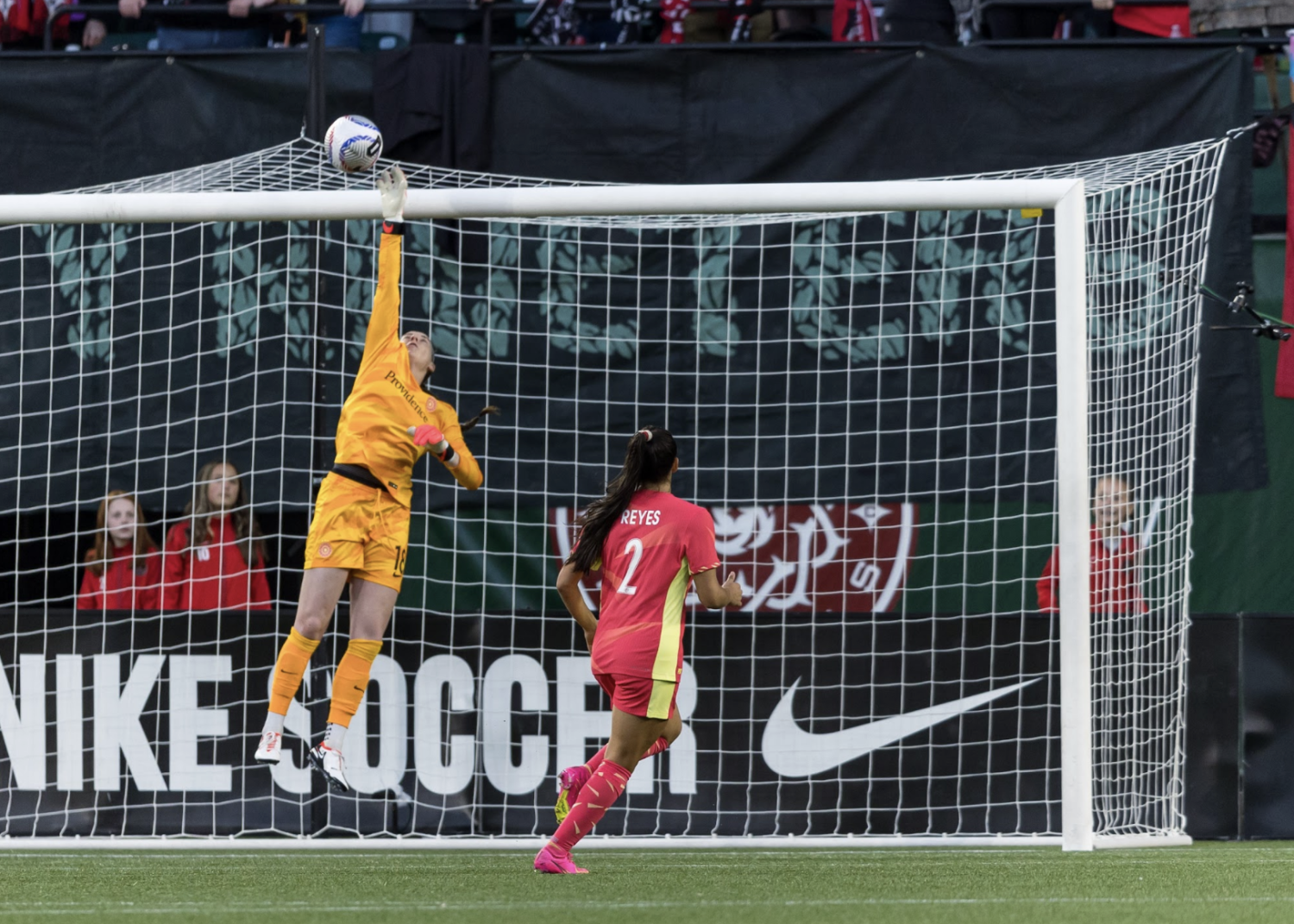
The Thorns’ one and only three-league-game week is this week, with the Bay and the Washington Spirit on deck for Wednesday and Sunday, respectively. It will be Gale’s first real test to see how he manages minutes for players to try to get nine points from the week.
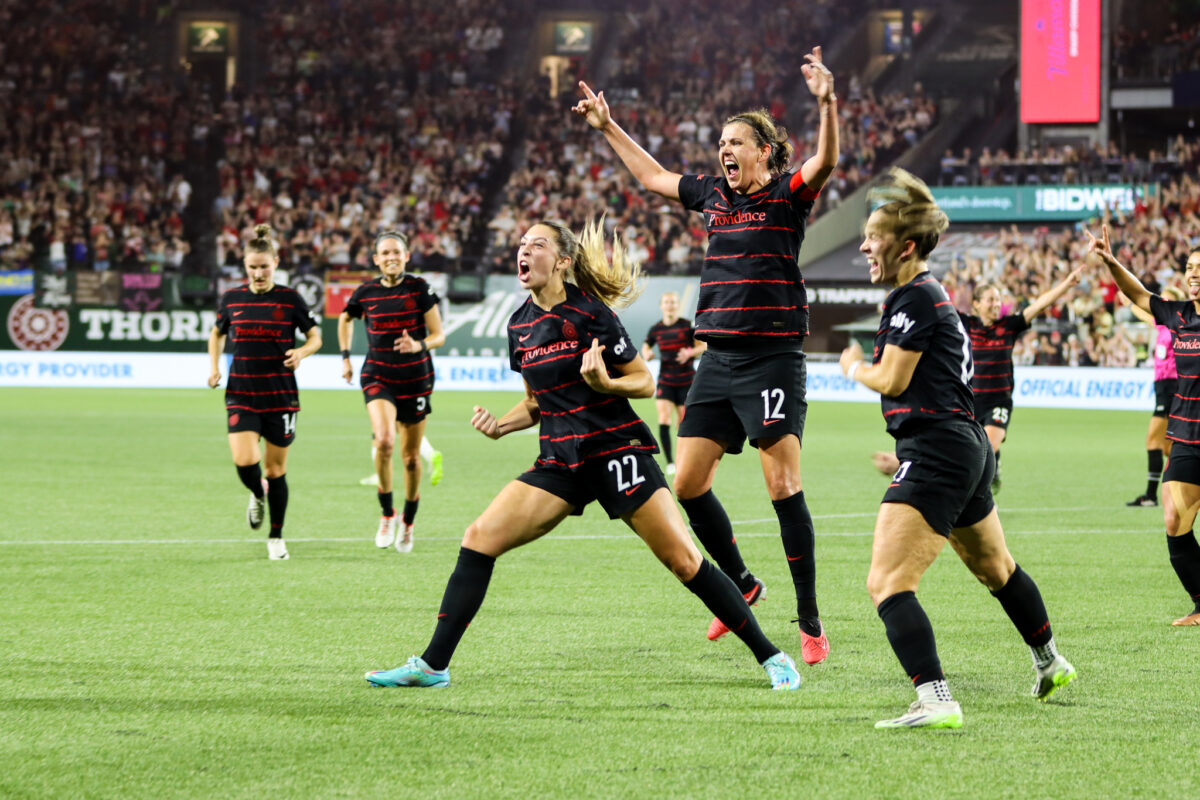
It felt as though the vintage Portland Thorns were back in action Saturday night, as they soundly defeated OL Reign in front of a sold-out Providence Park. It was the last time that the complete trio of Megan Rapinoe, Jess Fishlock, and Lu Barnes would face Christine Sinclair in Portland—which undoubtedly helped increase attendance numbers and added a sentimental tenor to the entire game. All four players reassured the crowd that during those 90 minutes the teams were fighting for more than just three points in a tight end of season table; they were fighting for the pride of their cities.
It was the first time since the inaugural 2013 season that Portland managed to take both home and away wins against Seattle in the regular season, and their first home win of the rivalry since 2018. Hopefully, such a solid beating of a longtime and fierce rival will propel the Thorns to end the season, helping them pick up their first three consecutive wins since 2019, as well.
Last week at a league-wide press conference, NWSL Commissioner Jessica Berman confirmed that the Thorns were on track to being sold by the end of the calendar year and that Merritt Paulson no longer sits on the Board of Governors. (Portland’s representative is currently Portland Timbers and Thorns CEO Heather Davis.) The process of the sale has taken far too long, but the confirmation that the team will in fact get a new owner (and hopefully new grass practice facility) makes me feel as though the Thorns can start to redefine themselves and their relationship to the city after a few dark years.
I find it hard to grasp the simultaneous nature of beginnings and endings, and this game represented both. The Thorns that I grew up with from 2013 through 2019 were different from the Thorns post-2020. Of course, the coaching and personnel changes are part of the natural course of a professional team, but since 2020, it has felt as though there is a disconnect between the team and its fans, largely brought upon by poor leadership decisions that have directly perpetuated and covered up abuse. Being free from the shadows of Paulson will allow the team to get their spot in the sun that they deserve.
Saturday’s game was the last time that Rapinoe played in Providence Park. Even though she is one of the Thorns’ biggest villains, it seems remiss to not talk about her. Of course, a rivalry game is about more than one player (and we will still have to deal with Fishlock next year…), but Pinoe seems to embody what it means to really love what you do and who you play for.
“We’re definitely two different types of people,” Sinclair said of Rapinoe postgame. “But what she’s done for the game, I think she’s helped inspire an entire generation of young soccer fans. And I fully support anyone that wants to grow women’s football, women’s sports. I’m gonna miss playing against her. This rivalry is gonna miss having her. I think our fans are gonna miss booing her.”
Pinoe has always made soccer fun. Even when I’m watching the USWNT play the most mediocre Vlatko-ball I’ve ever seen in the middle of the night, I know that as soon as Pinoe subs on she will liven things up and add flair and fun. I think that element of fun is something that has been missing from the Thorns’ culture for the past few years. The Thorns love emphasizing their mentality of winning and success, but sometimes I’m afraid that they’ve lost sight of the love of the game.
But then I see Pinoe hamming it up to the North End after scoring a goal or Morgan Weaver pretending to be one of those inflatable car-sale balloons, and I realize that these players do still have fun. Going forward, I want to see more of that: fun celebrations and laughing on the pitch and putting on a show. I want to thank Pinoe and the OGs for always having fun on the pitch, because it makes me have a lot more fun watching.
I also know how hard it is to remember why you are doing something when people, in particular your employers, are cruel or unhelpful. I sincerely hope that the sale of the team and dissociation from Paulson will fill the North End again and start selling out Providence Park. Even at 3:30 a.m. from my bed in Dublin, Ireland, I could see the influence that the city can have on a game.
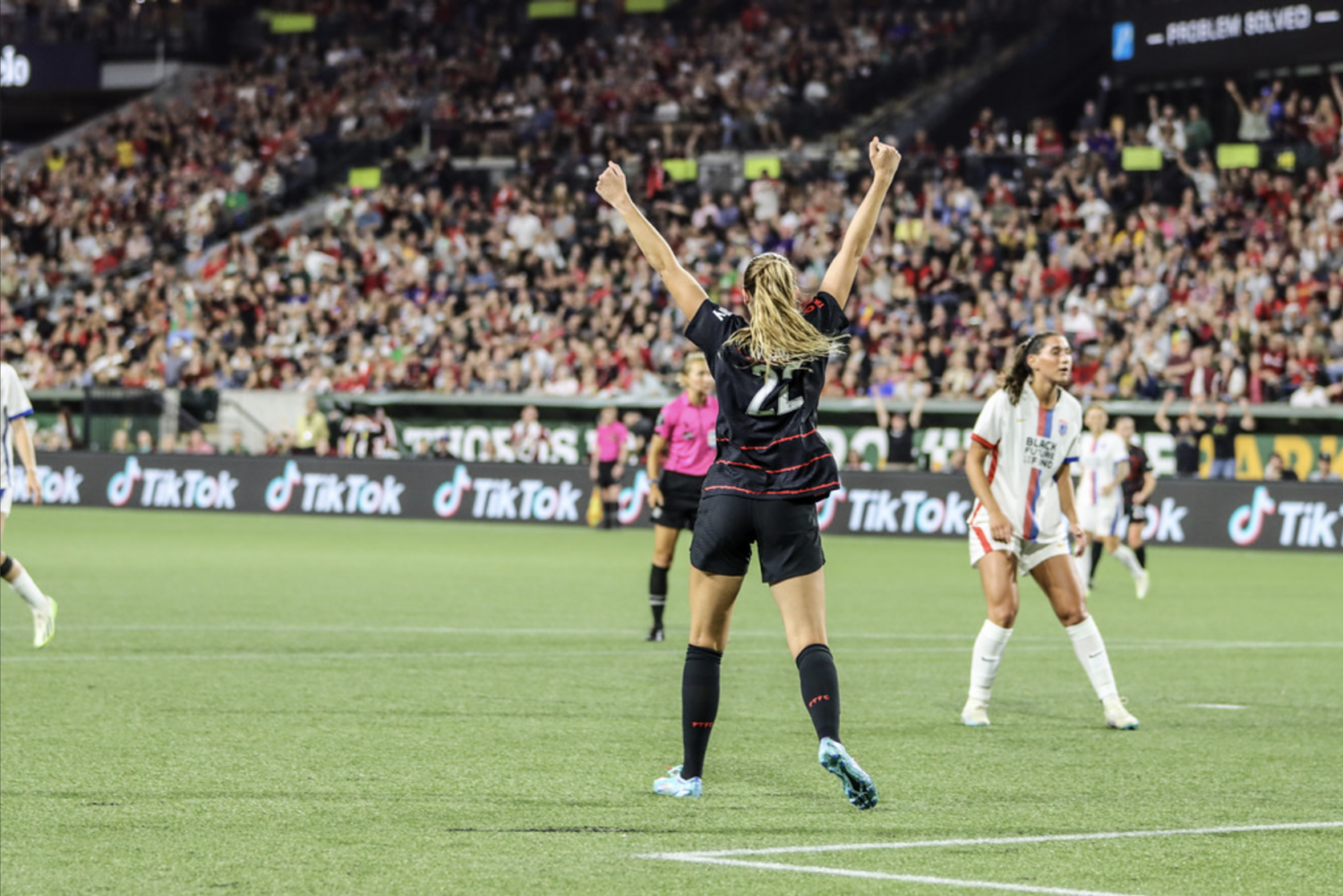
With every ending comes a new beginning. Morgan Weaver came alive as the new embodiment of the “F— Seattle” sentiment that is so necessary for a good rivalry. In a weird parallel with Pinoe, Weaver grew up in Washington but now plays for the rival state. Postgame, when asked about her celebration where she pointed enthusiastically at the Thorns badge on her jersey, she said, “I’m from Tacoma, but I’m just gonna show them where I love, and I love Portland, and I love being here and I love being on this team. So, I just had to let them know Portland’s where it’s at.”
Weaver has really come to life on the field this year. Her past seasons in Portland have by no means been lackluster—she has probably scored the most clutch game-winning goals for the team since she landed with the club in 2020—but she often falls into Sophia Smith’s shadow, being drafted second to her and playing alongside her. On Saturday, Weaver scored her 10th goal in all competitions this season off an incredibly well-struck volley straight back across goal. Her confidence in front of goal has skyrocketed, and it has made her a much more complete striker.
But what makes Weaver such a dangerous player is her dynamism. She had seven recoveries, the fourth most on the team, and also had the most shots on the team at four. Her involvement at both ends of the pitch is part of her core identity as a player. The fact that Weaver has been able to sustain this level of play throughout the season (she has played the third most minutes on the team) while consistently improving her awareness and skill shows how high her ceiling is. Luckily, she’s signed through 2025, and I can’t wait to see how much more she can grow.
Like Tobin Heath said in her podcast, “Portland being the best every year, that’s tradition.” And even with some traditions ending, the Thorns will always have players who embody the city and its weirdness and propel the team to greatness—just like Weaver showed everybody this weekend.
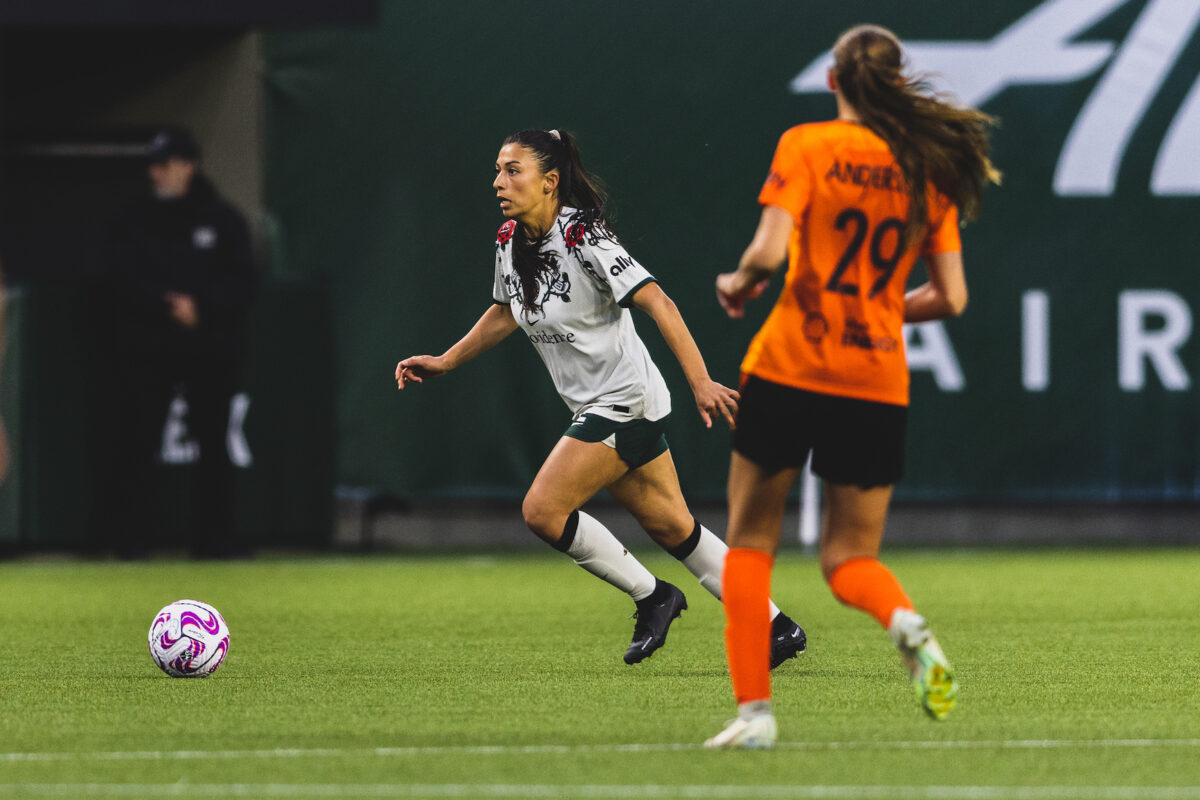
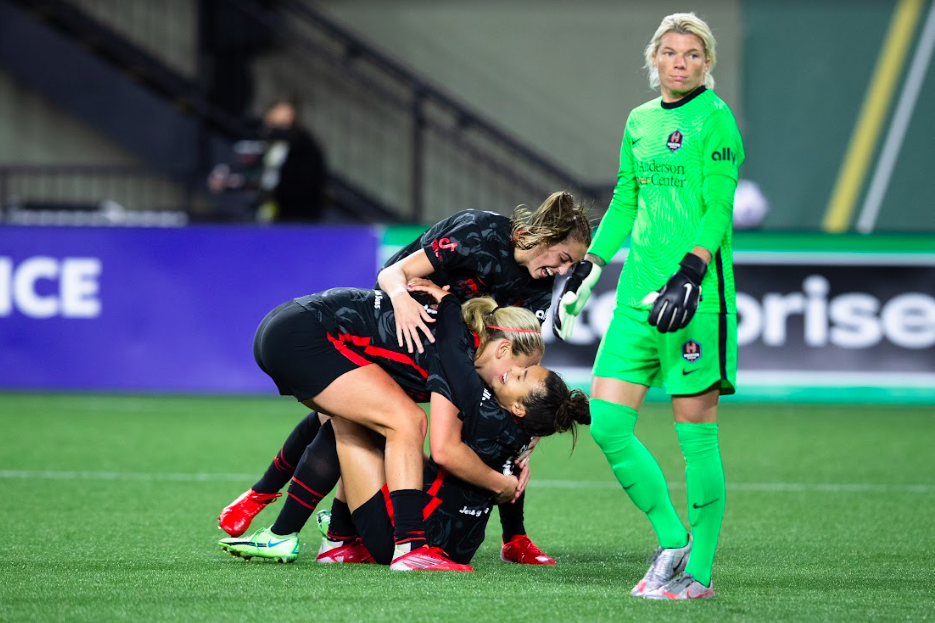
For the Thorns, the 2021 season has been all about building a strong mentality and culture. Through interviews and post-game pressers, Thorns players and coaches have spoken about the importance of their culture shift to their success this season. Back in August, Christine Sinclair said that “[the Thorns] want to put [themselves] in the best position to win, and not by chance,” which has been the byproduct of a team that has fun together—and fights and gives everything for each other.
Since Sinc spoke in August, a reckoning has occurred in the league, with its shockwaves landing firmly in the Thorns’ locker room. In a turnaround from the recent four-game winless streak that’s had people doubting the team’s chances of winning the Shield—something they were favored to do for the majority of the season—the team managed to pull out a win against Houston, looking the best they had against the Dash all year.
The season isn’t over yet, with one last home game against the Courage to go, but I think last night’s win against Houston to claim the shield was a culmination of an entire season’s worth of work both on and off the field. So, in honor of that, here are some things that went really well for the Thorns.
Historically, the Thorns have struggled to break down the Dash’s back line. In the Thorns’ 1–0 win in July, they recorded 14 shots, dramatically lower than usual. Just a few weeks ago in October, the Thorns lost 2–3, putting only nine of 26 shots on target. Forwards Sophia Smith and Morgan Weaver (among others) like to sit high, ready to either get the ball at their feet or receive a long ball over the top, and over the course of the season, the Thorns have struggled to score when they weren’t able to press high and sit along the back line. But last night, Smith and Weaver were able to find all sorts of space between the Dash’s defense, and exploited it well, combining for six shots.
One moment that exemplified the ever-strengthening Thorns mentality was a shot by Sophia Smith in the first half. She was played a ball in from Meghan Klingenberg and after taking one touch to settle it, sent it rocketing towards the goal. She missed, but the important element of the shot was Smith having the confidence to take it early. So many times over the course of the season we have watched Smith dribble towards the goal, only to end up passing it straight to the keeper, and it’s much better for her to test the keeper with a harder, earlier shot than not.
The Thorns have clearly found their ideal starting midfield with Sinclair, Rocky Rodríguez, Angela Salem, and Lindsey Horan (it’s wild that they still have Dunn on the bench to bring on). The passing chart below shows how important it is that the midfield keep their shape in order to dictate play throughout the center of the field. The heavier lines extending from Rocky and Horan’s bubbles indicate the volume of passes that each player gave and received, showing how they maintained possession, continuously feeding balls forward toward the pressing forwards.
Mark Parsons said post-game, “we knew we needed to control everything we can to put it in our favor,” which manifested in the form of the midfield being first to what felt like every ball. They dominated the center of the pitch, intercepting Houston passes and serving as the catalyst for counterattacks, many of which nearly paid off.
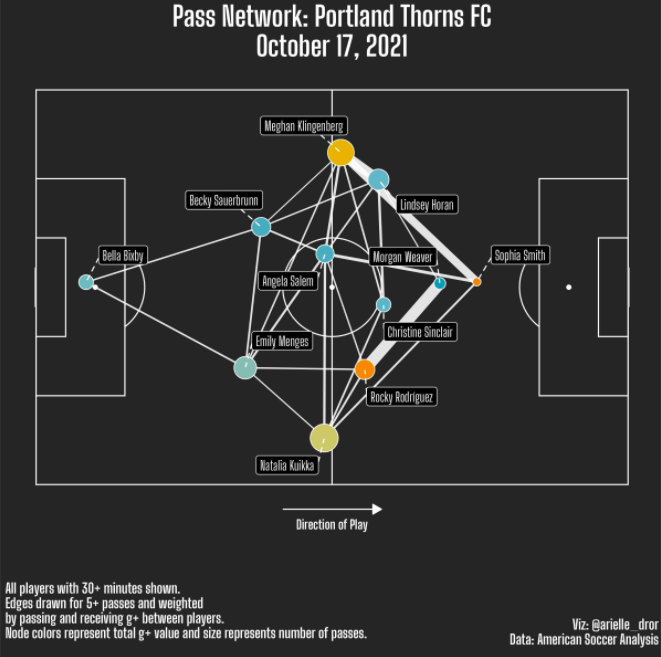
When looking back at the season holistically, the Thorns struggled to reintegrate their international players after the Olympic break, largely due to the bulk of them being in the midfield. Finally having a consistent lineup over the past few months has let the Thorns implement the tactics they have been working on, allowing them to improve each game.
Bella Bixby and the Thorns defense earned their 12th clean sheet of the season, and Bixby’s eighth. While a lot of the glory goes to the forwards and midfield for scoring, the defense has been quietly and consistently dictating games all season. Outside backs Kling and Natalia Kuikka had the most touches out of both teams on Sunday, and center backs Becky Sauerbrunn and Emily Menges contributed to the 48 duels won.
A quote from Bixby sums up the defense’s mentality quite nicely: “despite having big outcome-based goals, we have been extremely process-based, and [are] really just taking it one game at a time.” Bixby, who became the Thorns’ starting keeper after AD Franch went to Kansas City, has excelled at the position. She exudes confidence when directing her back line and stays focused until the final minutes, which yesterday was when the majority of the Dash’s crosses and shots came in. Plus, watching her palm the ball on saves is just epic.
With one more regular-season game to go before postseason, the Thorns are in a good place to continue growing and proving that their elite mentality is what sets them apart.
As Horan said after the game, the Thorns set out to win everything this season—and now the elusive quadruple is within reach.
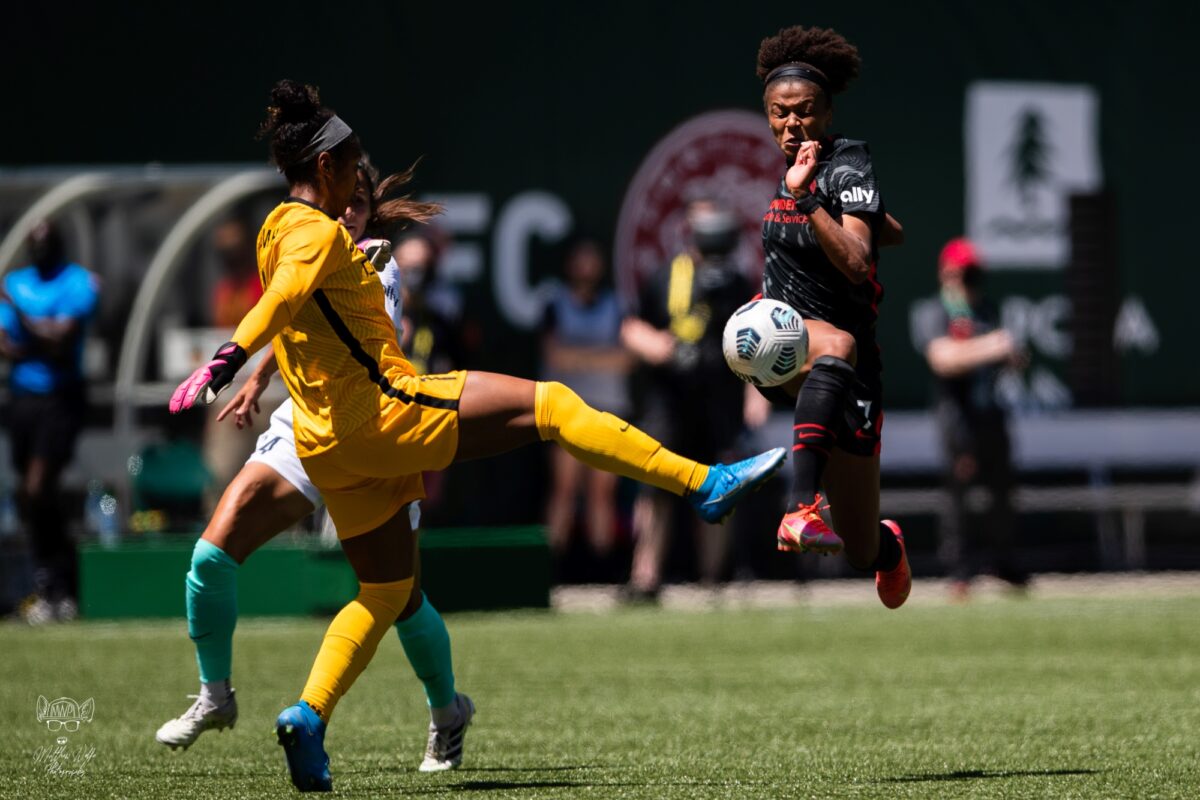
The Thorns held on for the three points on Sunday in a match featuring Simone Charley’s second regular season goal (!!), 80% fan capacity at Providence Park (!!), and some very warm weather for a late June Portland afternoon.
Here are a couple of my takeaways from the game:
I’ve talked a lot about the Thorns and missed chances this year, and I think this game was (hopefully) a turning point in that regard. It’s not that Portland did an especially good job on capitalizing on their chances—they recorded 20 shots on the afternoon, with only one goal to show for it—and it’s weird to say this match marked a shift right before five players step away from the team for the Olympics.
Still, I think Mark Parsons said it best when asked about Christine Sinclair’s missed penalty after the match:
“I think the team were excellent because we missed chances. I think we missed three or four chances that we should score. And I thought, in other games that could affect our decisions. OL Reign or Orlando, when we went through that period, a decision starts to get a bit more desperate, and we were starting to force things or take things on early or not play as fluid, as free in our decision making. I thought it was the opposite today.”
It doesn’t hurt that Simone Charley was the one who scored, either—both because she had the most good looks on goal of any player in the first half and because she’ll still be around through Olympic absences.
“For me personally, it was great to be able to get a goal and use that as momentum going into the Olympic break,” Charley said. “I think you got a taste of seeing how deep our team is, so I’m pretty excited for these upcoming weeks.”
I hope I’m not the only one who saw Sunday’s lineup and immediately thought of the last time Sinc played as a dual No. 9 for the Thorns—specifically alongside Tobin Heath in Portland’s Very Weird last two games of 2019.
Fortunately, things were different this time around. Parsons said Tyler Lussi, Sophia Smith, and Morgan Weaver were all dealing with small injuries going into the match, and Charley had taken some time off during the international break for personal reasons.
(It was probably less fortunate for Elizabeth Ball—both in terms of her team losing the match and in terms of being on the receiving end of an interesting yellow card for “the offense of handling the ball to stop a promising attack,” according to match officials.)
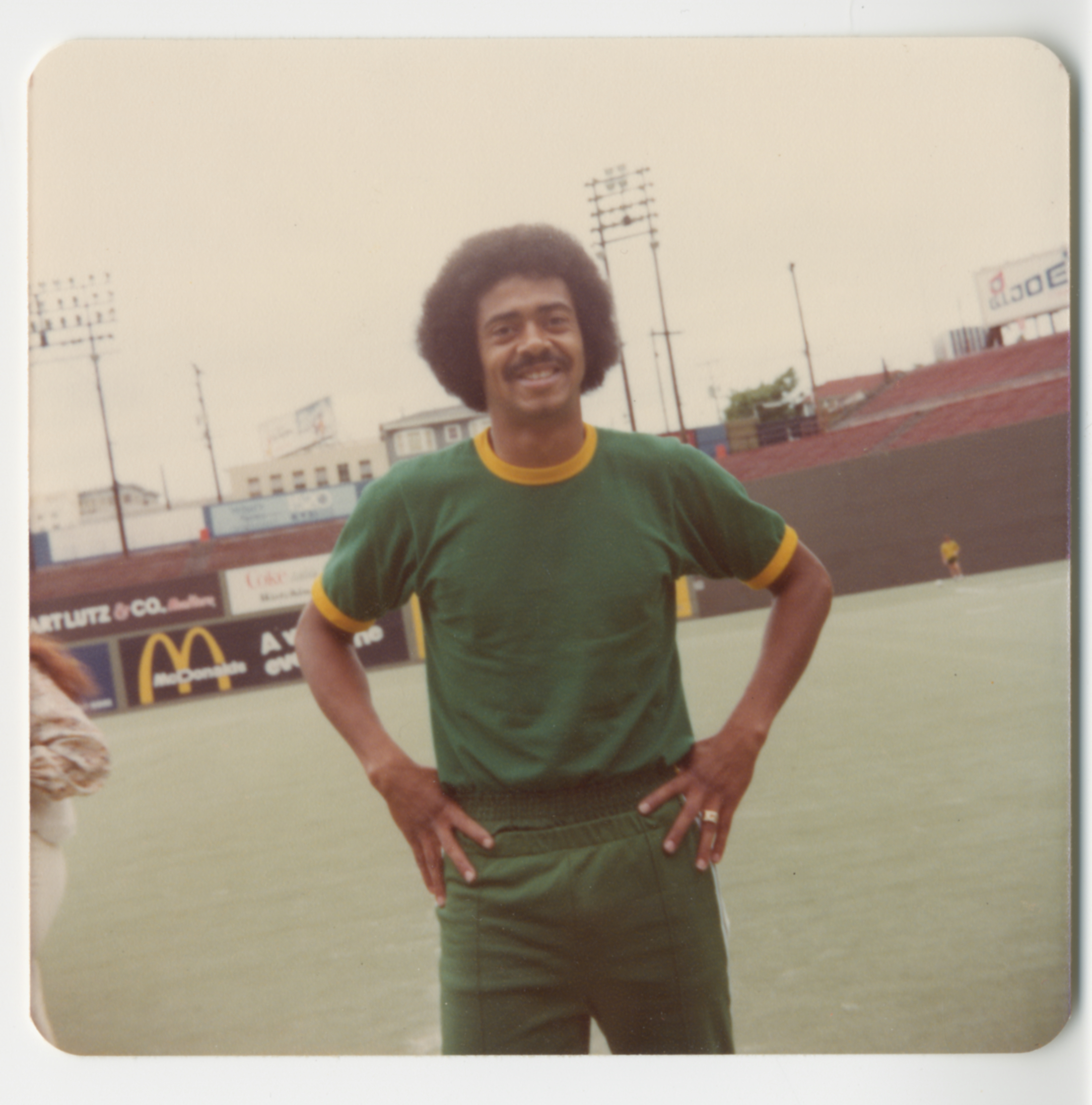
It is December of 2002. The University of Portland women’s soccer team is in Austin, Texas, about to play Santa Clara for the NCAA championship. The Oregonian calls the team “more blue collar than showtime”; they’re known for their gritty defense, which has shut out every opponent so far, and their star striker, a sophomore out of Burnaby, British Columbia named Christine Sinclair, who has notched seven goals so far in the playoffs. They are a tight-knit group, punching well above their weight for a school of just over 3,000 students.
They have a rallying cry: win it for Clive. Their beloved coach, the 50-year-old Clive Charles, told the team he had cancer last spring. He’s getting treatment, but it’s a losing battle. In his thirteen seasons coaching the women, he’s come close to a championship several times, but never won, and his team knows this might be his last shot.
Here in Portland, a thousand or so students pile into the Chiles Center to watch the game on the big screen. UP students mingle with alumni and families; in one section, a pack of rowdy kids wearing only face paint and “kilts” (really a few yards of tartan fabric wrapped haphazardly around the waist) who call themselves the Villa Drum Squad pound drums and chant.
This is where women’s soccer as it exists in Portland today started to take shape. The scale is small, but you can catch a glimpse here of what Providence Park will look like 15 years in the future, just before a Thorns game kicks off—the drums, the tifos, the buzz in the air. At a school with no football team, in a city deeply unaccustomed to winning championships, Christine Sinclair is the biggest show in town.
This is the house that Clive built—without it, the Thorns wouldn’t be what they are—and in building it, he touched countless lives. Here’s how he did it, from the perspectives of three of those people.
It is 1978, the Timbers’ fourth year in existence. Clive has just arrived in Portland. Soccer is still a novelty in the states, but the NASL is growing, with aging stars like Pelé, Franz Beckenbauer, and George Best drawing attention. Attendance for the Timbers has been respectable, with averages between 13,000 and 20,000 in their first three seasons.
The club bought Clive from Cardiff City, where he had captained the team to promotion to the second tier. Brian Gant, a midfielder for the Timbers from 1977–1982—who is also, not coincidentally, Christine Sinclair’s uncle—describes Clive as “ahead of his time” as a player, an attacking outside back before attacking outside backs were really a thing.
“The back four back in those days, it was all about take no prisoners,” Gant says. “You had these all these big, strong physical guys, but he was a flair player who had a great left foot, incredible. He used to always tell guys, ‘hey, guys, I could play a tune on the piano with this left foot.’”
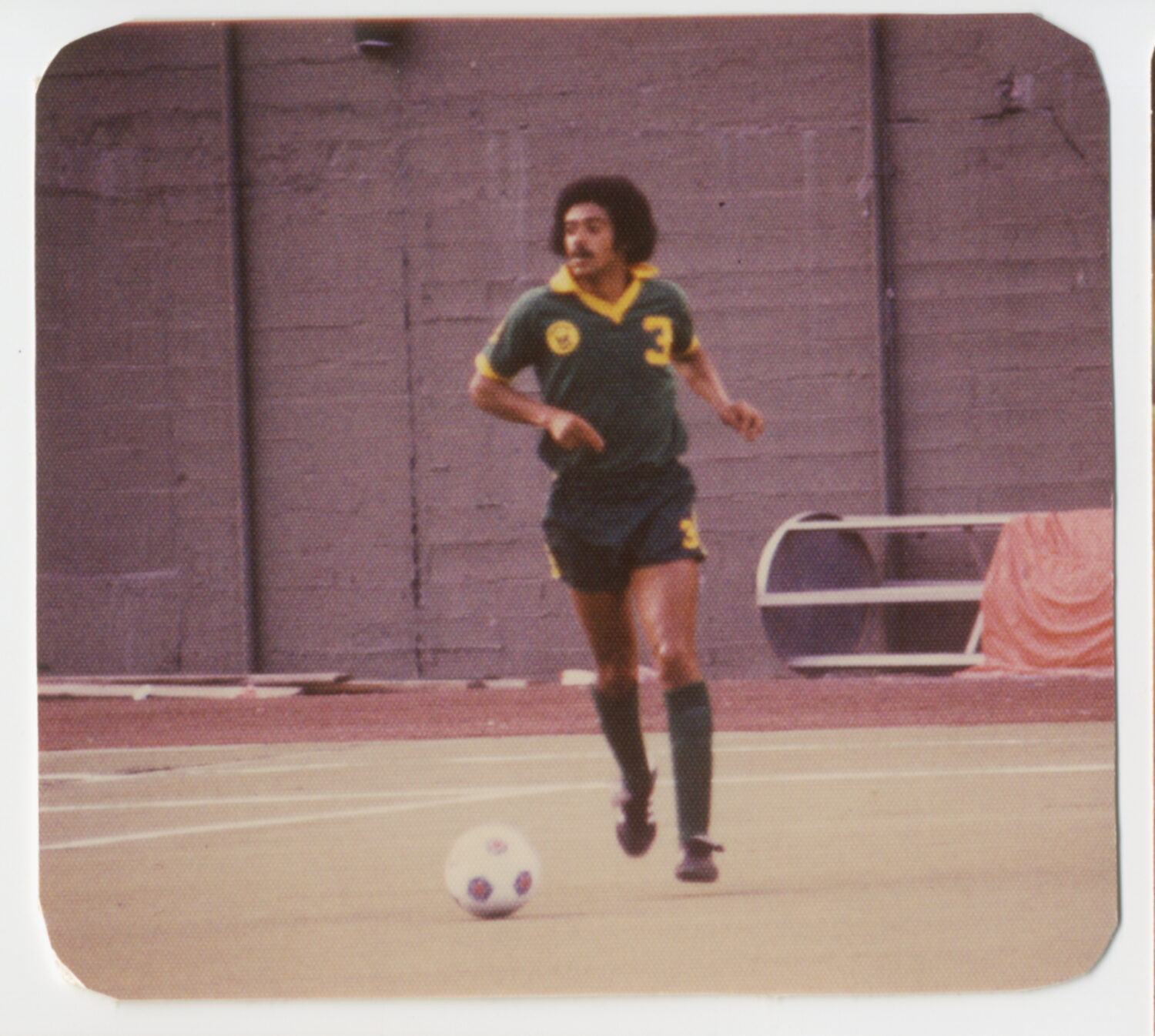
But it’s Clive the teammate, not Clive the player, who would really make an impression. That spring, when he walked into the Timbers’ dressing room at Catlin Gabel for the first time, the gravity shifted in his direction. “I thought, wow, he’s a friendly sort of guy, he is,” remembers Gant. “He was just the most easygoing, funny, just charismatic guy you’d ever meet.”
By that time, a substantial contingent of Timbers players were calling Portland home year-round. The club had already brought on Gant, Clyde Best, Willie Anderson, and John Bain. “The league itself was starting to become a lot more professional. And, you know, players were starting to come here, and Portland had a great reputation of being a good soccer city. The fans took care of us… the Timbers Army was started back then. And it was well looked at throughout the league, as well, as a great little soccer town.”
The team started to cohere, with Clive at its center. “Clive was the type of guy that was always talking and wanting to do things,” says Gant, who paints a picture of that time as a kind of summer camp. Much of the team lived in the same area in Beaverton, and they started going to lunch together every day. At lunch, they’d make plans for the rest of the day—golf if it was nice or pool if it wasn’t, always competitive. “Pretty soon, you had this whole group of guys that were all of a sudden not just connected on the soccer field, but connected off the soccer field.”
Clive called everyone by a nickname. Gant, who is tall and lanky, was Spider Man or Spidey, and eventually just Ganty; Clive himself was Charlo or Chazzy or the Dean of Divot, on the golf course. “We all knew it wasn’t to make fun of the person. It was to make that person feel special. Like, ‘oh, I got I got this title!’” He had that effect on people, of making them feel special.
There was no spotlight for an NASL player. The crowds weren’t huge, and many fans didn’t really understand the game. But they were enthusiastic, in part because Clive and his teammates spent time selling the game of soccer to the community. Clive could make friends with anybody, and the team as a whole was accessible on a level that’s unthinkable today. There were signings at Fred Meyer; after games, the team would go to the bar at the Hilton or the Benson and someone would invite them to their kid’s birthday, and they would actually go. “We’d show up at a party and say hi to the kids, play soccer with the kids in the backyard,” says Gant. “And you know, get a free meal.”
A few years later, like so many American leagues, the NASL went under. Clive spent the last few years of his career playing indoor soccer, which he reportedly hated, bouncing from Pittsburgh to LA. Eventually he and his wife Clarena came back to Portland, drawn by the growing soccer community the Timbers had sown. Back home, players of Clive’s caliber were a dime a dozen—and for a Black man, the outlook was especially poor. “He said, ‘Ganty, if I go back to England, all retired soccer players, all they want to do is open up a pub.’” He didn’t want that. He wanted to build something.
It is the early 1980s. Clive is putting flyers under windshield wipers at a strip mall in Gresham.
Clive was a product of the West Ham academy, and he had a vision for Portland: a development pipeline from the youth level up through college, a place for local kids to get real training and grow into world-class talents.
But first he had to find the kids. So he and his fellow coaches, including Gant, would xerox a stack of pamphlets advertising a weekend- or week-long camp and pass them out all over town. Before long, they were booked for a whole summer, and Clive had secured a sponsorship from Fred Meyer.
It was at one of those camps that a particular kid, seven or eight years old, caught Clive’s attention. Tiffeny Milbrett was the only girl on the field, and Clive was transfixed. “He said, ‘oh my god, this kid is something else,’” remembers Gant. Their meeting was to set into motion a chain of events that ends with the Thorns becoming the best-supported women’s club in the world.
At that time, high-level women’s soccer basically didn’t exist. It wasn’t an NCAA sport until 1982; the first World Cup wouldn’t happen until 1991. Clive had grown up in a country whose governing body refused to sanction women’s competitions. But he didn’t bat an eye to see a girl dominating her age level.
“[That’s the] biggest thing with him, because even in this day and age,” says Milbrett, “there’s still plenty of men who don’t want to respect women in general, let alone respect women playing sports… I mean, we didn’t even have names for it back then, and he truly was a human being that, literally across the board, he was going to give the same respect and attention.”
He quickly became not just Milbrett’s coach, but a mentor and a role model. “He adored that kid,” says Gant, “ not only as a soccer player but as a person.”
Milbrett calls Clive “the most important male influence in my life. Most people probably just thought he was my coach, but he really influenced me in a very strong way through the game.”
From a young age, she was independent and confident, both on and off the field. Growing up with a single mom who had to leave for work early every day, she was often responsible for herself. “I think I’m very independent because of how I grew up,” Milbrett says. “And Clive really was one of the first top-level coaches that, it was ok to be a very, very strong, independent, confident woman. He was never, ever afraid of strong women. Ever. And you have far too many men, even the ones that say that their coach is 100% to the women’s side—I’m sorry, I experienced too many men that even in the women’s game, they can’t handle strong women.”
Where many coaches use their authority like a cudgel and feel threatened by questions or dissent, Clive saw Milbrett’s independence as an asset and nurtured it, helping her grow into the fearless goalscorer she became. “Tiffeny was the vision,” says Gant. “Clive said, I want a team full of those… that’s why he said, ‘we’ve got to have FC Portland, we’ve got to have that. We’ve got to develop these kids.’”
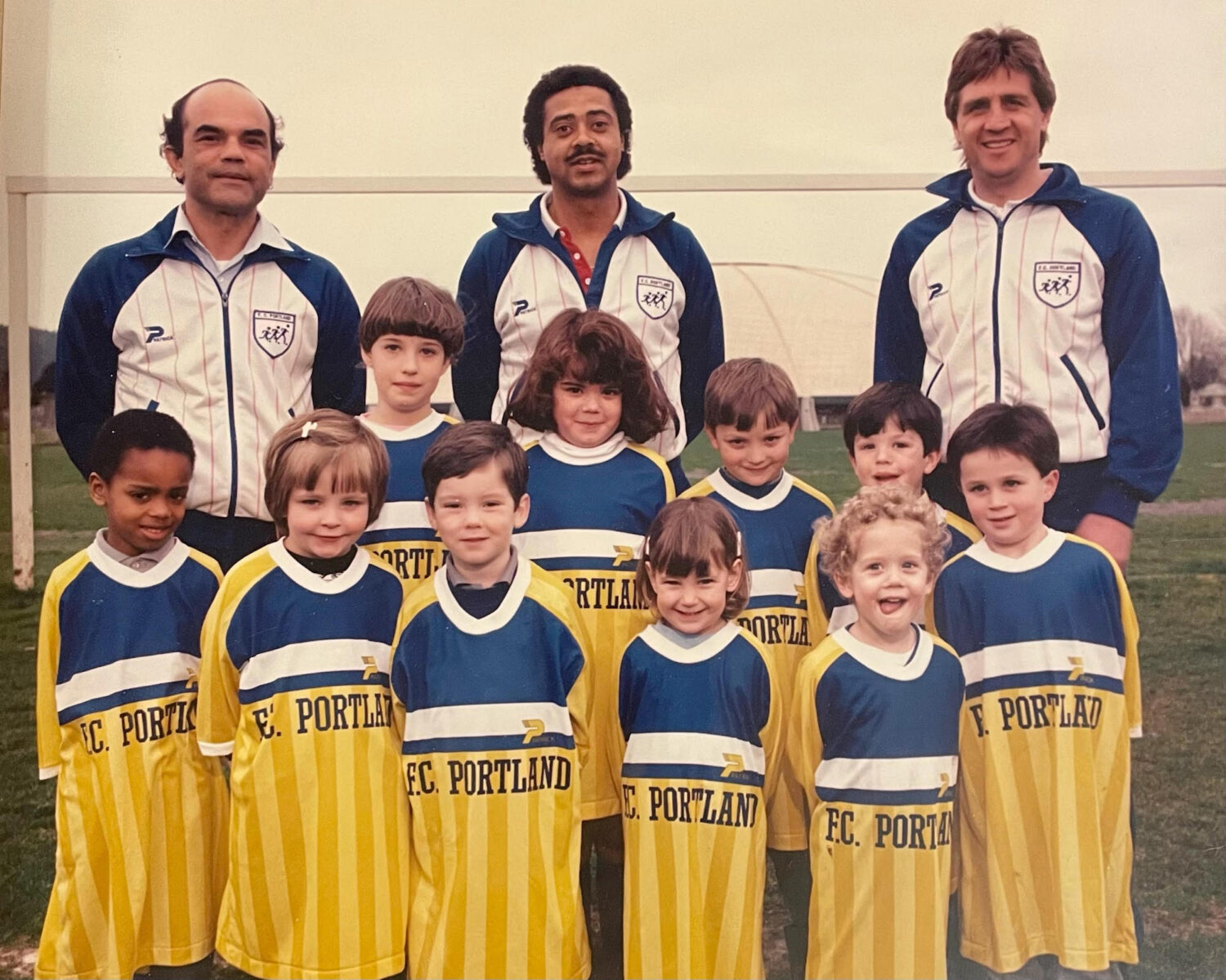
By 1987, he’d scrapped the clinics and started FC Portland, where Milbrett trained through the end of high school. By that point, Clive had been coaching the University of Portland men for a few years, and it was largely because of a desire to keep coaching Milbrett that he agreed to take over the women’s program, too.
UP was a small school, and Clive relied on his personality and his reputation as a coach, rather than the reputation of his program, to draw players. Anson Dorrance, who had helped push the NCAA to recognize women’s soccer as a collegiate sport, was drawing the vast majority of the top talent to North Carolina. “When Clive was picking players,” Gant says, “The first thing he did, he says, ‘I got to have quality character.’… so many of the girls that played for Clive that made the program so special were hard-working players. They’re good, honest citizens, good, honest students. They weren’t necessarily the best players throughout the country.”
Of course, there were exceptions, genuine world-class talents who came through UP. Milbrett was one; Shannon MacMillan, who Milbrett overlapped with, was another. Then there’s the GOAT herself.
It is 2001. Christine Sinclair has just started at UP.
It wasn’t a coincidence that Sinc ended up in Portland. Clive had been a presence in her life before she was born. “My parents used to actually rent a house from him and Clarena up in Canada,” she told me a few years ago (Clarena is Canadian, and the couple had considered moving to Vancouver after Clive’s playing career). Clive didn’t just build women’s soccer in Portland, he built its most important player, kind of literally.
Sinc choosing UP was the natural outcome, but not just because her family knew Clive. As a shy 18-year-old, she needed a nurturing environment like his program. “I think I would have gotten lost in some of those bigger schools,” she said when she signed with the Thorns.
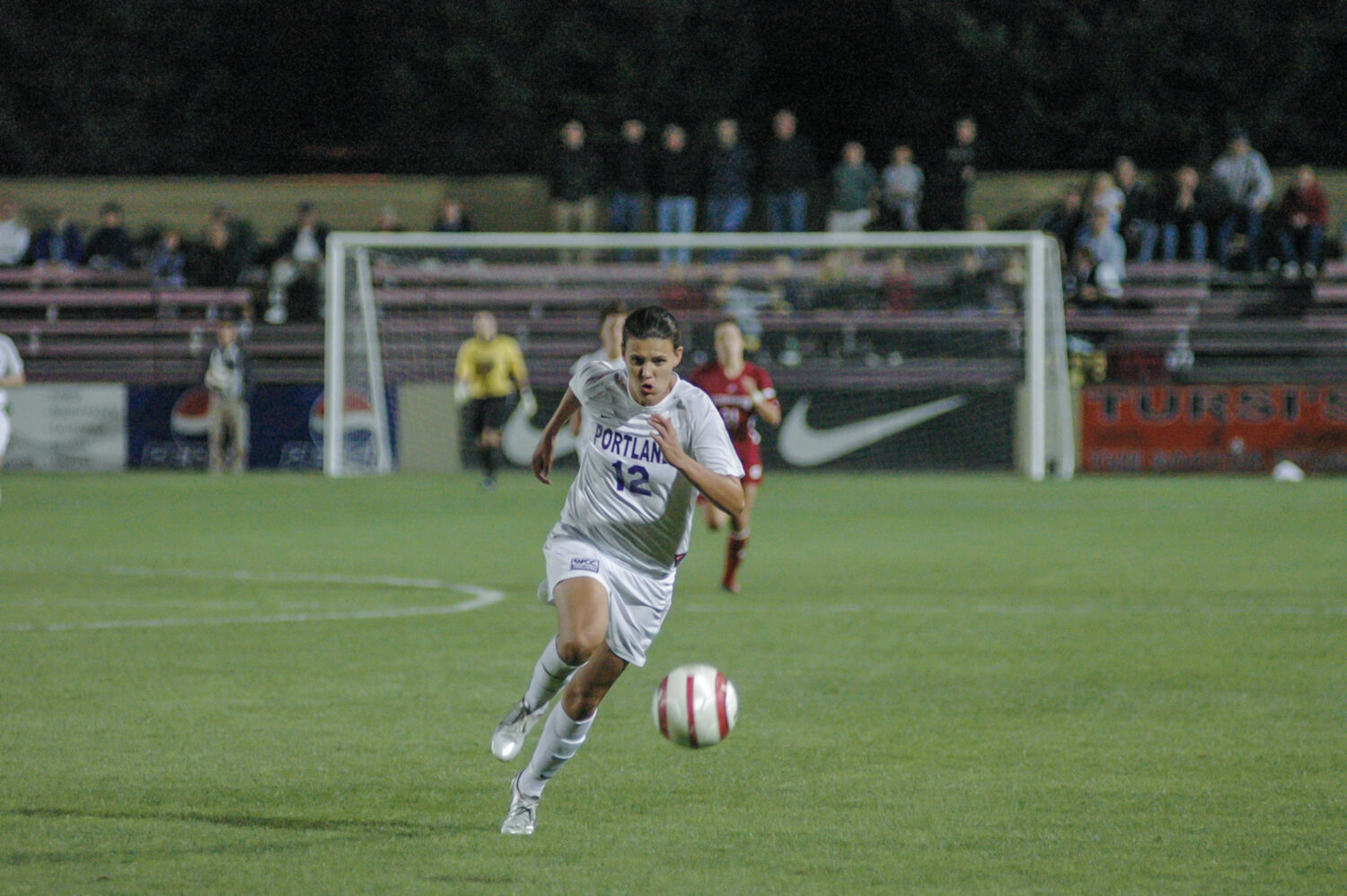
“She came here for the way [he mentored] people,” says Gant, “and because Sinc’s a pretty quiet kid, for the most part. She’s pretty quiet. And she was like that growing up.”
Sinc would probably have become a legend wherever she’d gone to college, but it’s less clear she would have become the kind of legend she is—the respected leader, the consummate teammate—without Clive’s influence. Clive was gregarious and charming where Sinc is quiet and thoughtful, but if you’ve heard Sinc’s teammates talk about her, listening to people who were close to Clive talk about him sounds familiar.
“It’s full and complete and total trust,” Milbrett says of him as a coach, “because first and foremost, he was just an outstanding human being to you. And that’s how you build up a player, that’s how you build up a person—building that kind of relationship through trust.”
Sinc could have gone to any school in the country. By her 18th birthday, she had already scored 21 goals for Canada, and she’d gotten a stack of scholarship offers. But she didn’t want to go to the most successful program; she wanted the coach who cared about her. “He was the only coach I talked to who was actually interested in me as a person,” she wrote in 2012. “For people who have ever been recruited, this is very unique.”
Clive would rib Sinc about her shyness, and soon she’d start teasing him back. As they got to know each other, she started to come out of her shell and speak up, where she’d usually stayed on the fringe when she was younger. “She toughened up a lot, coming to college,” Gant remembers. “You know, she learned to respect her voice. And she learned to communicate with teammates and coaches, and it really changed who she was as a person, I think.”
The Pilots went 16–3 Sinc’s freshman season and were eliminated in the College Cup semifinal by North Carolina. Sinc notched 23 goals, eight of them game winners. That spring, Clive called together “the Pilot soccer family, current and past players,” as Sinc wrote, and gave them the news: he’d been battling a rare form of prostate cancer for two years, after being diagnosed while coaching the US men at the 2000 Olympics. He intended to keep coaching, but nobody knew how much time he had left.
The Pilots faithful, a few hundred strong in purple and white, greeted the team at the airport. They’d brought their drums along and chanted so loud the TSA agents couldn’t hear the metal detectors.
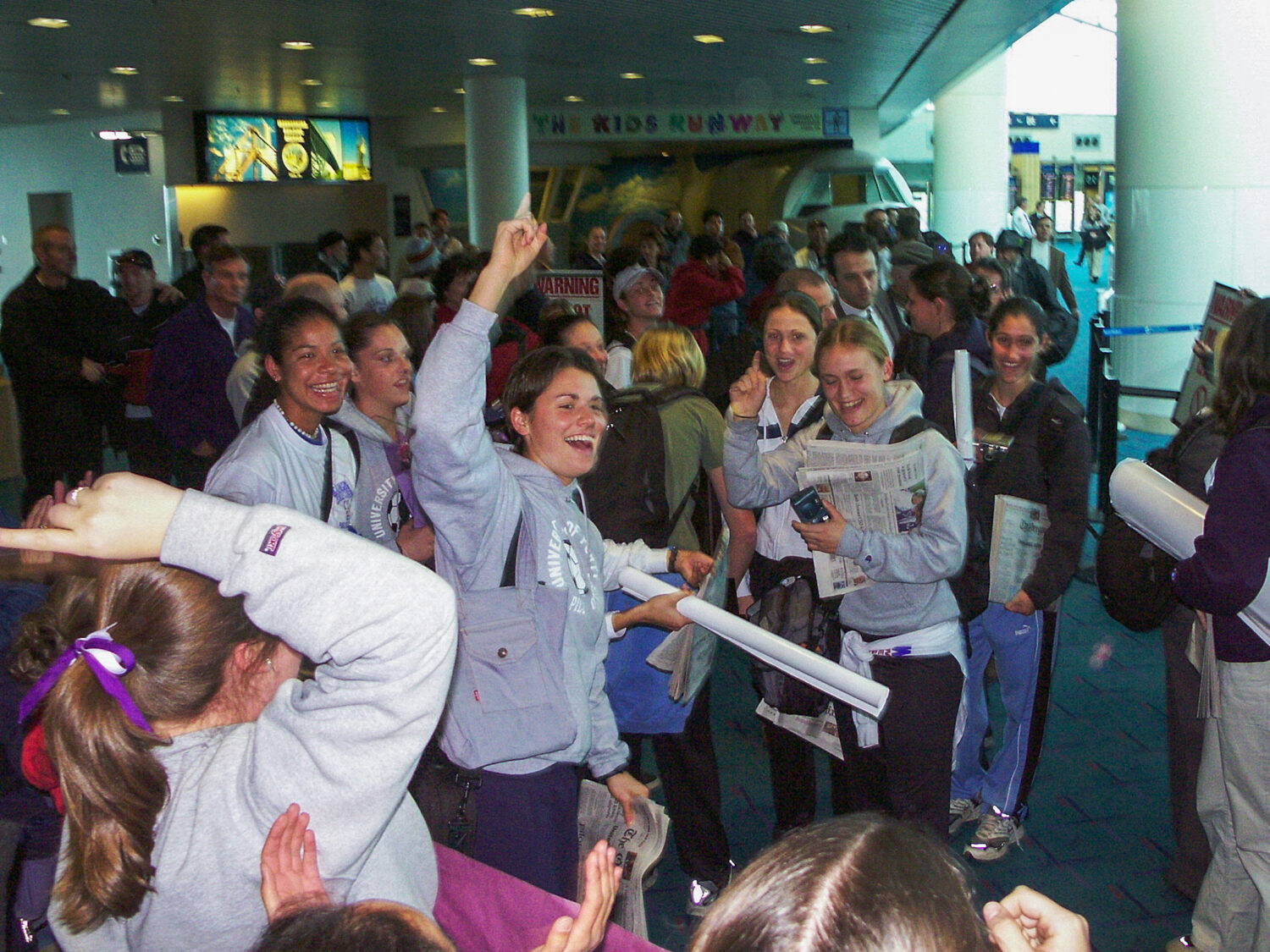
The team had been victorious in Austin; after they’d gone down 0–1 early in the second half, Sinc had leveled the score in the 61st minute, then scored the sudden-death game winner in overtime. Several players described a feeling that divine intervention was at work during the tournament. Clive said the win was “like a ten-ton weight has been lifted off me” and vowed not to let the trophy out of his sight. Supposedly he slept with it next to him that night.
Clive passed away in August of 2003. That championship win was the last game he ever coached. His players kept his memory alive, and the Pilots won another in 2005.
The kids and families and queer women who cheered the team on from the Chiles Center, many of them, would go on to form the Rose City Riveters. They’d learned how to love soccer at UP, and they helped show the world what support for a women’s club could look like.
Clive left an impression on everyone he ever met, and changed the lives of countless people he never did meet. His legacy goes way beyond this story. But it’s hard to overstate what he did for women’s soccer. The Riveters wouldn’t be what they are without UP, the Thorns wouldn’t be what they are without the Riveters, and the NWSL wouldn’t be what it is without the Thorns. None of it would have happened without Clive.
Sinc, of course, went on to become a giant in the game, planted firmly in Portland since her college days. Her dog is named Charlie in Clive’s honor.
After retiring in 2011, Milbrett started coaching, a career that took her to Colorado and Florida. Now she’s back on the Bluff, coaching on a part-time basis.
Gant stayed on at FC Portland, where he still works today. When he ponders where Clive might have been now, he suspects he would have moved on from coaching and taken an administrative job in the game. It’s easy to imagine him as the Thorns GM, or a league commissioner.
“He loved coaching,” says Gant. “But it was about the game, too. It was about, how far can we take this game? And I remember when he was coaching the [2000] Olympic team, he felt bad because it was time away from his UP kids and time away from Portland and Clarena and all that. But he says ‘Ganty, the game—it’s a global game now. It’s everywhere. It’s unbelievable.’ And you know, he’d just been diagnosed with cancer and everything. And it got emotional at times, because when he started talking about it, he sort of said, ‘and I might miss it.’”
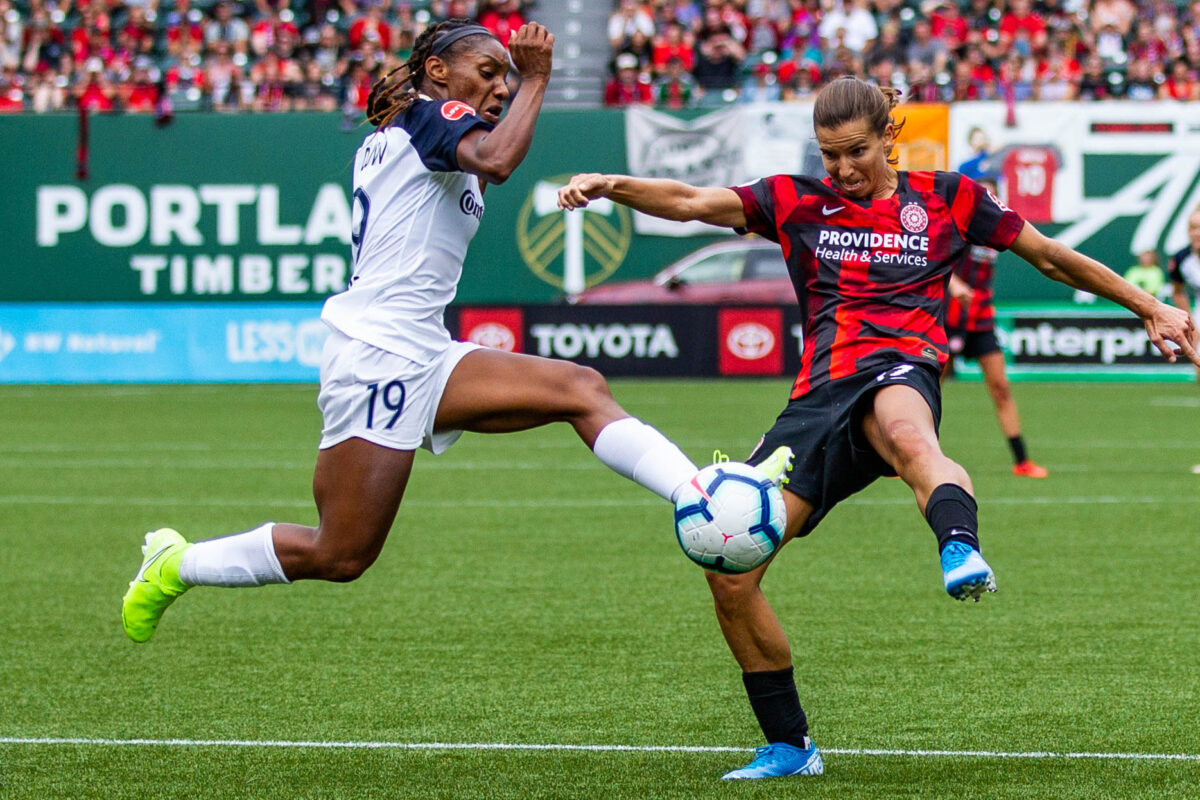
Unless you’ve had your head under a rock for the last six hours, you’ve likely heard the news: Crystal Dunn is a Thorn.
It’s not poppycock this time—thanks to OL Reign taking one for the team(s) and “facilitating” the trade. The 2019 World Cup Champion, two-time NWSL Champion, NWSL golden boot winner and MVP of the 2015 season’s move to Portland (finally) extends beyond the offseason.
In exchange, the Thorns sent the Reign $150,000, a 2021 international slot, and Portland’s natural first-round pick in the 2022 college draft. Here are a few of our takeaways about the big news:
With multiple expansion drafts on the horizon and no clear answer to whether soccer in the traditional sense will even be possible in 2021, the Thorns’ future—like that of many teams in this league—is uncertain (more on that in a minute). What looks pretty watertight at this juncture is that Portland’s midfield is going to involve all of Lindsey Horan, Crystal Dunn, and Christine Sinclair.
Those players aren’t going anywhere, which is, uh, crazy? It feels like cheating. Then again, when Dunn went to North Carolina, that also felt like cheating—so maybe what it boils down to is that having Crystal Dunn is cheating.
Dunn is one of the few players in the world who can genuinely bend a game to her will. She can score practically at will and is equally dangerous at both dribbling and passing. She’s a defensive threat, too. It’s hard to overstate how huge an acquisition she is for the Thorns, especially when you start to think about her connecting with oh, say, Sophia Smith.
This looks like a superteam for now, but not so fast. Three expansion drafts are looming in the next two years, with one—for Racing Louisville—happening in less than a month. Don’t expect this to be the last move Portland makes this offseason.
Assuming the rules are the same as they were in 2015, the Thorns will be able to protect nine players, including two USWNT-subsidized players. As things stand, the two protected subsidized players have to be Dunn and Horan. We’d already expected them to lose at least one keeper, likely AD Franch, but now she, Heath, and Sauerbrunn will all be on the chopping block. (Sophia Smith is blissfully saved by the fact that USWNT allocations won’t be announced until after the expansion draft.) Sauerbrunn probably doesn’t get taken—she’s 35 and has made it clear she wants to settle down in Portland. We think she tells any interested team she’ll retire rather than report.
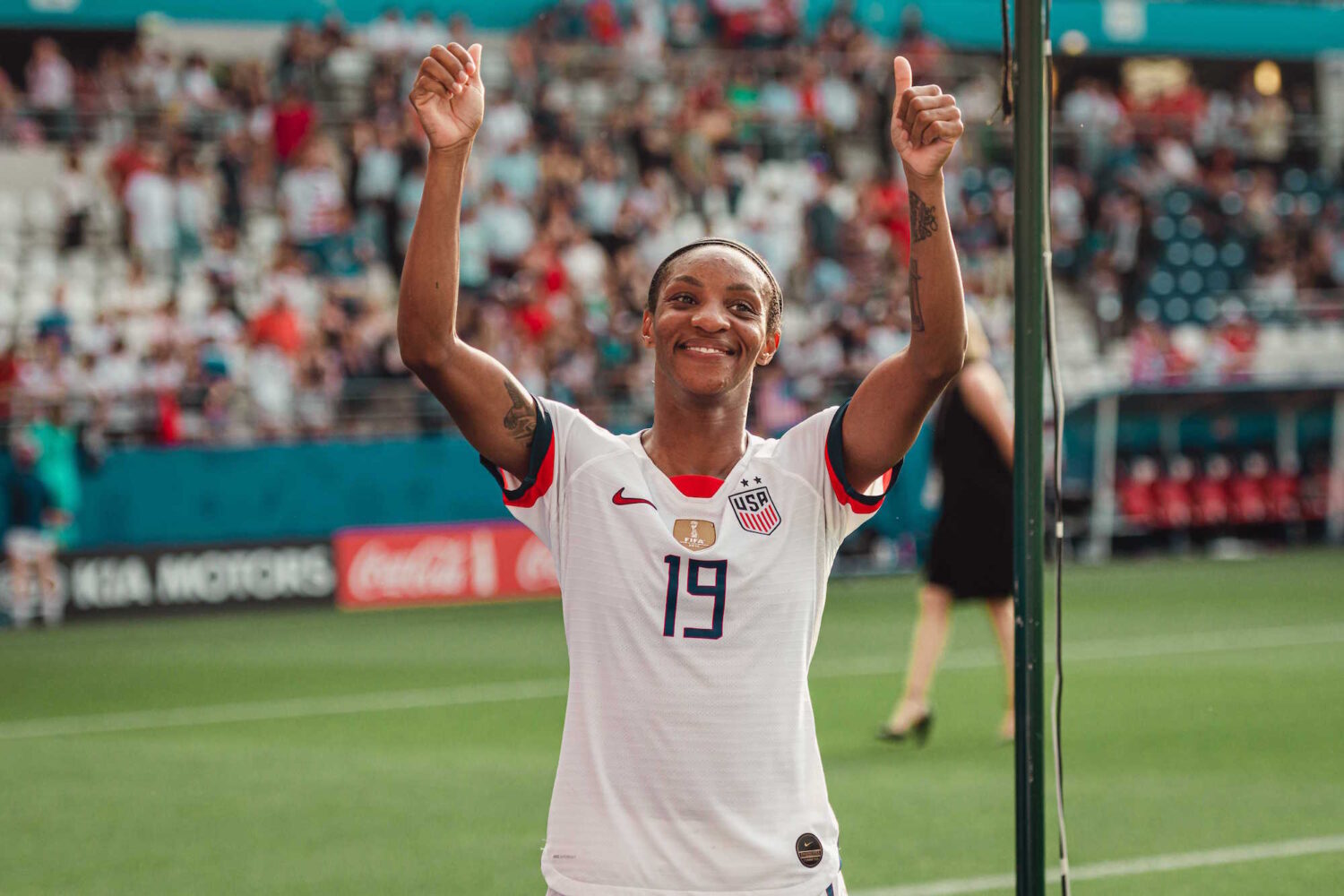
Heath? Harder to say. She also owns a home here and clearly likes playing for the Thorns. She also holds the same leverage as any elite player in this league: she can always decide to extend her time in Manchester rather than move to Louisville or Sacramento. However: it’s not hard to imagine, say, Louisville picking up her rights, her deciding to stay in England for 2021, and then forcing a trade to LA for 2022.
Of course, that’s assuming the Thorns can scam them into taking the rights of someone who probably doesn’t plan on playing for them, but the Thorns have a pretty solid track record when it comes to taking advantage of other teams (see: The Alex Morgan Trade). That’s also assuming Angel City wants Heath on their side, but it’s hard to imagine a team saying no to her if she asks.
We’ve all been dreading/denying the inevitable: that one day, sure as the cruel sea beats cliffs into sand, Christine Sinclair will have to retire. That she’s had an almost unbelievably long and consistent career doesn’t change how problematic this is for the Thorns in the long term.
A situation that we think epitomizes this pretty well was last year, when the Thorns tried three different players at the No. 10 while Sinclair was away for the World Cup. Dagný Brynjarsdóttir, Ana Crnogorčević, and Andressinha—may she be free forevermore—are all good players, but the team’s reliance on an all-time great in that position showed in her absence.
Dunn is the answer to that, positionally at least. As far as Sinclair’s importance to the locker room, there’s of course no real replacement, but Mark Parsons seems to think Dunn has some of the same qualities as a leader, too. “She has such a contagious energy about her that just wants to make you be better when you’re around her,” he said in an interview released by the team today. “But what she doesn’t get praise enough for is her leadership, and the way that she leads. By example, and by being positive, and by being driven. She’s had a lot of success, and it’s not by luck.”
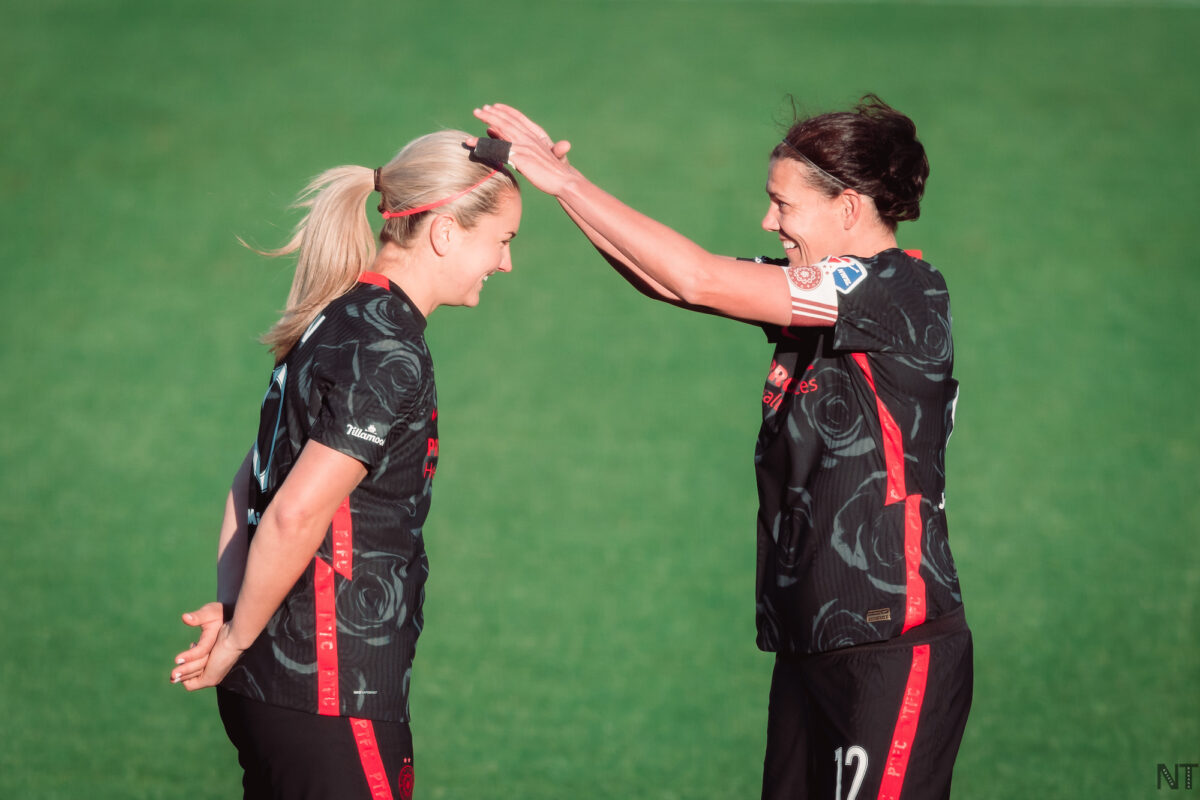
So, there have been four soccer games, and the Thorns won three quarters of them, which puts them ahead of the Houston Dash to win the Verizon Community Shield in the NWSL Fall Series.
That doesn’t mean a third star—it wasn’t a real season, after all—but it sounds like Portland has other ideas. “We were joking maybe we could get a little ghost, or maybe a mask to put on our jerseys,” Christine Sinclair said tonight, “but we’ll figure that out in the offseason.”
Even with the notable lack of a star, the winners of the Shield aren’t leaving Cheney Stadium empty-handed. The 2–1 victory secured them the first place prize for the fall season: a $25,000 grant to a local business. For the Thorns, that’s Mimi’s Fresh Tees, a “woman owned social justice t-shirt company,” according to the company’s Instagram.
The Thorns wore Mimi’s Tees to their home game on September 30—what would turn into a 4–1 win over OL Reign.
http://www.instagram.com/p/CFyBDs-jXrA/
“It’s great to have something to play for,” said Becky Sauerbrunn after tonight’s match. “As a team we’ve really dug deep into, okay, how can we help, especially our community […] To be able to give an independent business in Portland this amount of money, we’re really proud, and we’re really happy that we get to contribute to the community.”
While that’s wonderful to see, I have to say I’m not sure I took all that much from the game from a soccer perspective. OL Reign came out of the gate strong, with the likes of Bethany Balcer and Jasmyne Spencer putting Portland’s defense under a decent amount of pressure. As Sauerbrunn pointed out, though, the Thorns did a fantastic job of defending as a team and were able to both weather the storm and steal a penalty kick goal to give them the lead before halftime.
Tacoma lost their edge after the first half hour of the match, although they did sneak one past the Thorns’ defense off a 46th-minute free kick. And then there was another buried penalty that allowed Portland to regain their lead.
But besides the goals and the Thorns absorbing that initial run of Reign offense, I can’t say it was a particularly fun match. Tacoma decided to play a tightly-marked game and tackle hard when Portland had the ball, and the Thorns, for their part, weren’t able to play out of that pressure for longer than a few passes.
Yeah, maybe Portland being a little sharper on the attack could’ve earned them a few points—they looked marginally better than they did on three day’s rest at Utah last weekend. And maybe they would have beat Casey Murphy, who was playing incredibly high off her line, if that had been the case. But they didn’t, and the match was a tricky one as a result, with the exception of a few plays.
The thing about Amber Brooks is that silly—some might say bad—defending isn’t anything new for her. Nine times out of ten, though, that manifests itself in getting caught too far up the field (something that isn’t super ideal for a center back), or ball-watching as her mark makes a relatively unimpeded run to the goal.
Rarely does it mean that she’s involved in all three of a game’s goals, fouling two different Thorns in the box to create Portland’s penalties and directing a weirdly-deflected ball on frame for OL Reign’s lone goal of the night.
Obviously I want to contextualize it with the fact that three of them were penalties, but Christine Sinclair scored six goals in the last three games at the age of 37, and I feel like we should talk about that.
She’s also very clearly living her best life right now, which she deserves:
The visiting locker room in Tacoma seems like the place to be tonight. 🥂 #BAONPDX pic.twitter.com/oQjjNcoKiP
— Portland Thorns FC (@ThornsFC) October 11, 2020
